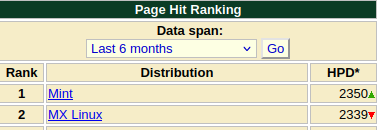view the rest of the comments
Linux
Welcome to c/linux!
Welcome to our thriving Linux community! Whether you're a seasoned Linux enthusiast or just starting your journey, we're excited to have you here. Explore, learn, and collaborate with like-minded individuals who share a passion for open-source software and the endless possibilities it offers. Together, let's dive into the world of Linux and embrace the power of freedom, customization, and innovation. Enjoy your stay and feel free to join the vibrant discussions that await you!
Rules:
-
Stay on topic: Posts and discussions should be related to Linux, open source software, and related technologies.
-
Be respectful: Treat fellow community members with respect and courtesy.
-
Quality over quantity: Share informative and thought-provoking content.
-
No spam or self-promotion: Avoid excessive self-promotion or spamming.
-
No NSFW adult content
-
Follow general lemmy guidelines.

It might just be a matter of perspective. I'm not very knowledgeable on distros, so my opinion may come from ignorance:
To me, Ubuntu is too resource intensive with too much going on. Mint seems relatively lean yet modern, with all the basics covered. Debian is a little sparse (no sudo, no fdisk, what's going on here?).
Kubuntu is where it’s at.
Everyone forgets Xubuntu 🫠
Who told you you can't sudo on Debian? ^^ I feel like Debian is flexible enough to give you the system you might want without the bullshit. Ubuntu has lost its way last decade, but you can still debloat it mostly and use one of its alternatives. The Cinnamon DE has improved a lot, but it still feels like Windows Vista to me.
I ended up using NixOS lately so I can have the flexibility, newer packages and very clean repeatable configuration.
I haven't seen sudo installed by default on debian. Probably the comment is about that. When you start you tend to use only what is already there to not mess things too much.
Sudo is installed on Debian by default, but the default user is not in the sudo group by default. This is intended behavior and is different than Ubuntu or Mint, where the default user created during install is automatically part of the sudo group.
I dont remember exactly, but I understood the error as the generic command not existing when I tried it. I will check again when I can.
In Debian, if you don't set a root password during the install your first user is added to the sudo group.